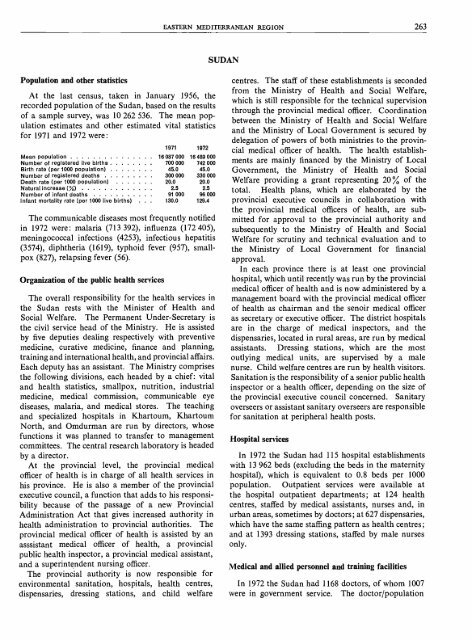FIFTH REPORT - World Health Organization
FIFTH REPORT - World Health Organization
FIFTH REPORT - World Health Organization
You also want an ePaper? Increase the reach of your titles
YUMPU automatically turns print PDFs into web optimized ePapers that Google loves.
EASTERN MEDITERRANEAN REGION 263<br />
SUDAN<br />
Population and other statistics<br />
At the last census, taken in January 1956, the<br />
recorded population of the Sudan, based on the results<br />
of a sample survey, was 10 262 536. The mean population<br />
estimates and other estimated vital statistics<br />
for 1971 and 1972 were:<br />
Mean population<br />
Number of registered live births<br />
Birth rate (per 1000 population)<br />
Number of registered deaths<br />
Death rate (per 1000 population)<br />
Natural increase (%)<br />
Number of infant deaths<br />
Infant mortality rate (per 1000 live births)<br />
16<br />
1971<br />
087 000<br />
700 000<br />
45.0<br />
300000<br />
20.0<br />
2.5<br />
91 000<br />
130.0<br />
1972<br />
16 489 000<br />
742 000<br />
45.0<br />
330 000<br />
20.0<br />
2.5<br />
96 000<br />
129.4<br />
The communicable diseases most frequently notified<br />
in 1972 were: malaria (713 392), influenza (172 405),<br />
meningococcal infections (4253), infectious hepatitis<br />
(3574), diphtheria (1619), typhoid fever (957), smallpox<br />
(827), relapsing fever (56).<br />
<strong>Organization</strong> of the public health services<br />
The overall responsibility for the health services in<br />
the Sudan rests with the Minister of <strong>Health</strong> and<br />
Social Welfare. The Permanent Under Secretary<br />
the civil service head of the Ministry. He is assisted<br />
by five deputies dealing respectively with preventive<br />
medicine, curative medicine, finance and planning,<br />
training and international health, and provincial affairs.<br />
Each deputy has an assistant. The Ministry comprises<br />
the following divisions, each headed by a chief: vital<br />
and health statistics, smallpox, nutrition, industrial<br />
medicine, medical commission, communicable eye<br />
diseases, malaria, and medical stores. The teaching<br />
and specialized hospitals in Khartoum, Khartoum<br />
North, and Omdurman are run by directors, whose<br />
functions it was planned to transfer to management<br />
committees. The central research laboratory is headed<br />
by a director.<br />
At the provincial level, the provincial medical<br />
officer of health is in charge of all health services in<br />
his province. He is also a member of the provincial<br />
executive council, a function that adds to his responsibility<br />
because of the passage of a new Provincial<br />
Administration Act that gives increased authority in<br />
health administration to provincial authorities. The<br />
provincial medical officer of health is assisted by an<br />
asssistant medical officer of health, a provincial<br />
public health inspector, a provincial medical assistant,<br />
and a superintendent nursing officer.<br />
The provincial authority is now responsible for<br />
environmental sanitation, hospitals, health centres,<br />
dispensaries, dressing stations, and child welfare<br />
centres. The staff of these establishments is seconded<br />
from the Ministry of <strong>Health</strong> and Social Welfare,<br />
which is still responsible for the technical supervision<br />
through the provincial medical officer. Coordination<br />
between the Ministry of <strong>Health</strong> and Social Welfare<br />
and the Ministry of Local Government is secured by<br />
delegation of powers of both ministries to the provincial<br />
medical officer of health. The health establishments<br />
are mainly financed by the Ministry of Local<br />
Government, the Ministry of <strong>Health</strong> and Social<br />
Welfare providing a grant representing 20 % of the<br />
total. <strong>Health</strong> plans, which are elaborated by the<br />
provincial executive councils in collaboration with<br />
the provincial medical officers of health, are submitted<br />
for approval to the provincial authority and<br />
subsequently to the Ministry of <strong>Health</strong> and Social<br />
Welfare for scrutiny and technical evaluation and to<br />
the Ministry of Local Government for financial<br />
approval.<br />
In each province there is at least one provincial<br />
hospital, which until recently was run by the provincial<br />
medical officer of health and is now administered by a<br />
management board with the provincial medical officer<br />
of health as chairman and the senoir medical officer<br />
as secretary or executive officer. The district hospitals<br />
are in the charge of medical inspectors, and the<br />
dispensaries, located in rural areas, are run by medical<br />
assistants. Dressing stations, which are the most<br />
outlying medical units, are supervised by a male<br />
nurse. Child welfare centres are run by health visitors.<br />
Sanitation is the responsibility of a senior public health<br />
inspector or a health officer, depending on the size of<br />
the provincial executive council concerned. Sanitary<br />
overseers or assistant sanitary overseers are responsible<br />
for sanitation at peripheral health posts.<br />
Hospital services<br />
In 1972 the Sudan had 115 hospital establishments<br />
with 13 962 beds (excluding the beds in the maternity<br />
hospital), which is equivalent to 0.8 beds per 1000<br />
population. Outpatient services were available at<br />
the hospital outpatient departments; at 124 health<br />
centres, staffed by medical assistants, nurses and, in<br />
urban areas, sometimes by doctors; at 627 dispensaries,<br />
which have the same staffing pattern as health centres;<br />
and at 1393 dressing stations, staffed by male nurses<br />
only.<br />
Medical and allied personnel and training facilities<br />
In 1972 the Sudan had 1168 doctors, of whom 1007<br />
were in government service. The doctor /population
















